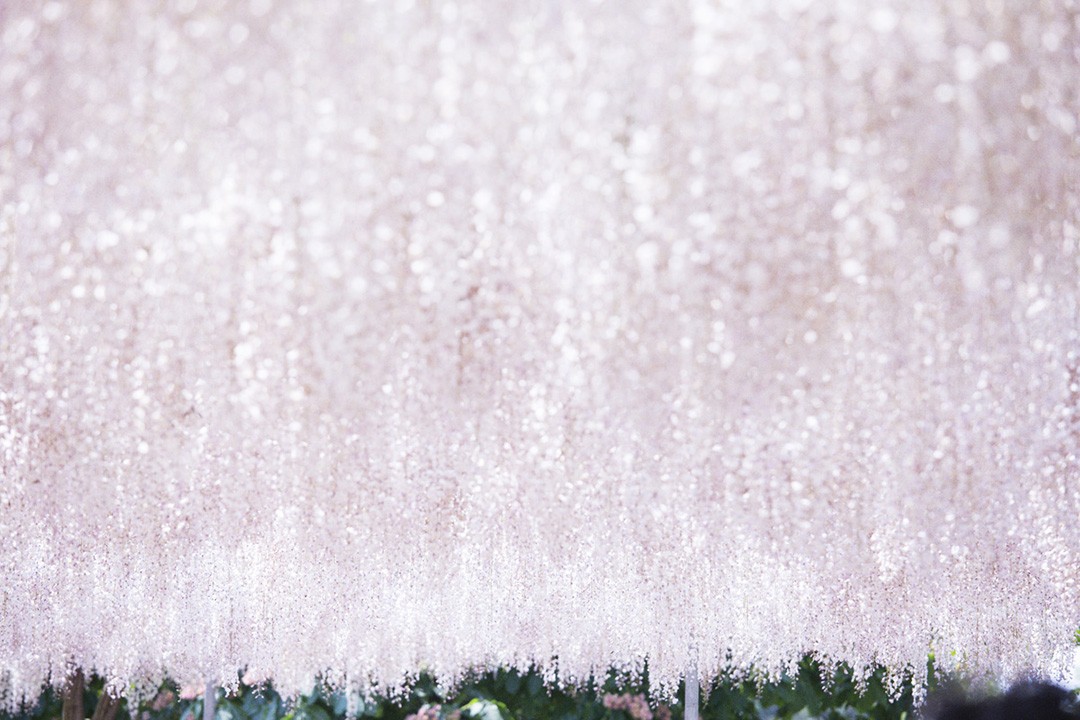Mika Ninagawa
10 - 19 May 2017
MIKA NINAGAWA
The days were beautiful
10 May – 19 May 2017
When I woke up in the morning, the sky was incredibly blue and beautiful. I thought it would be a nice day to depart if we all had to. (Mika Ninagawa, excerpt from The days were beautiful: translation by Futaba Fujikawa)
One might imagine the existence of landscapes that are perceivable only to people facing death their own or that of someone truly dear to them. People with such a sensitivity may look and suddenly see life glowing in the blue of the sky, in the budding leaves, in the scent of the wind, despite the constant sorrow and unease within them. Such was the sensitivity that lay behind the photographs that comprise The days were beautiful.
The 60 photographs by Mika Ninagawa that make up this exhibition are a record of the days that preceded the death of her father the theater director Yukio Ninagawa. In her words, they were taken "with the eyes of a person destined to die." In each photograph, the gaze of the father who would be leaving this beautiful world is superimposed on the gaze of the daughter who would inherit it. But, like footsteps that continue beyond the STOP sign in one of the photographs, the father's connection with the daughter and with the children of his daughter continues even after the apparent end of life. These "beautiful days" of Mika and Yukio Ninagawa were captured during the year after the solo exhibition Mika Ninagawa: Self-image at the Hara Museum in 2015. "It is a mystery as to how I took them," she says about the photographs, so different are they from her previous work.
The Hara Museum's history as a private home where life and death, happiness and sadness once coexisted makes it the ideal venue for the presentation of one of Ninagawa's most personal endeavors to date. You are invited to come experience this very special 10-day exhibition with your own eyes and heart.
Artist Biography
Born in Tokyo, Japan, Mika Ninagawa is a recipient of many awards including the Grand Prize of the 7th Hitotsuboten, the Excellent Award of the 13th Canon New Cosmos of Photography Prize, the 9th Konica Photo Encouragement Award, the 26th Kimura Ihei Award and the Ohara Museum of Art Award (the 13th VOCA 2006 Exhibition). To date, she has published about 100 books. She directed her first feature-length film SAKURAN, which opened in 2007. Critically acclaimed in Japan and abroad, the film was a special entry at the 57th Berlin International Film Festival and the 31st Hong Kong International Film Festival. The exhibition Mika Ninagawa: Earthly Flowers, Heavenly Colors (2008) was launched at the Tokyo Opera City Art Gallery and toured art museums throughout Japan, where it attracted some 180,000 visitors. In 2010, her photo book MIKA NINAGAWA was published by Rizzoli New York. Her second directorial effort, Helter Skelter, opened in 2012 and was awarded the Silver Kaneto Shindo Award 2012. In 2016, she held Mika Ninagawa at the MOCA Taipei in Taiwan, a major solo exhibition that broke the museum’s previous attendance record. In 2014, she was appointed executive board member of the Tokyo Organizing Committee of the Olympic and Paralympic Games of 2020.
The days were beautiful
10 May – 19 May 2017
When I woke up in the morning, the sky was incredibly blue and beautiful. I thought it would be a nice day to depart if we all had to. (Mika Ninagawa, excerpt from The days were beautiful: translation by Futaba Fujikawa)
One might imagine the existence of landscapes that are perceivable only to people facing death their own or that of someone truly dear to them. People with such a sensitivity may look and suddenly see life glowing in the blue of the sky, in the budding leaves, in the scent of the wind, despite the constant sorrow and unease within them. Such was the sensitivity that lay behind the photographs that comprise The days were beautiful.
The 60 photographs by Mika Ninagawa that make up this exhibition are a record of the days that preceded the death of her father the theater director Yukio Ninagawa. In her words, they were taken "with the eyes of a person destined to die." In each photograph, the gaze of the father who would be leaving this beautiful world is superimposed on the gaze of the daughter who would inherit it. But, like footsteps that continue beyond the STOP sign in one of the photographs, the father's connection with the daughter and with the children of his daughter continues even after the apparent end of life. These "beautiful days" of Mika and Yukio Ninagawa were captured during the year after the solo exhibition Mika Ninagawa: Self-image at the Hara Museum in 2015. "It is a mystery as to how I took them," she says about the photographs, so different are they from her previous work.
The Hara Museum's history as a private home where life and death, happiness and sadness once coexisted makes it the ideal venue for the presentation of one of Ninagawa's most personal endeavors to date. You are invited to come experience this very special 10-day exhibition with your own eyes and heart.
Artist Biography
Born in Tokyo, Japan, Mika Ninagawa is a recipient of many awards including the Grand Prize of the 7th Hitotsuboten, the Excellent Award of the 13th Canon New Cosmos of Photography Prize, the 9th Konica Photo Encouragement Award, the 26th Kimura Ihei Award and the Ohara Museum of Art Award (the 13th VOCA 2006 Exhibition). To date, she has published about 100 books. She directed her first feature-length film SAKURAN, which opened in 2007. Critically acclaimed in Japan and abroad, the film was a special entry at the 57th Berlin International Film Festival and the 31st Hong Kong International Film Festival. The exhibition Mika Ninagawa: Earthly Flowers, Heavenly Colors (2008) was launched at the Tokyo Opera City Art Gallery and toured art museums throughout Japan, where it attracted some 180,000 visitors. In 2010, her photo book MIKA NINAGAWA was published by Rizzoli New York. Her second directorial effort, Helter Skelter, opened in 2012 and was awarded the Silver Kaneto Shindo Award 2012. In 2016, she held Mika Ninagawa at the MOCA Taipei in Taiwan, a major solo exhibition that broke the museum’s previous attendance record. In 2014, she was appointed executive board member of the Tokyo Organizing Committee of the Olympic and Paralympic Games of 2020.


